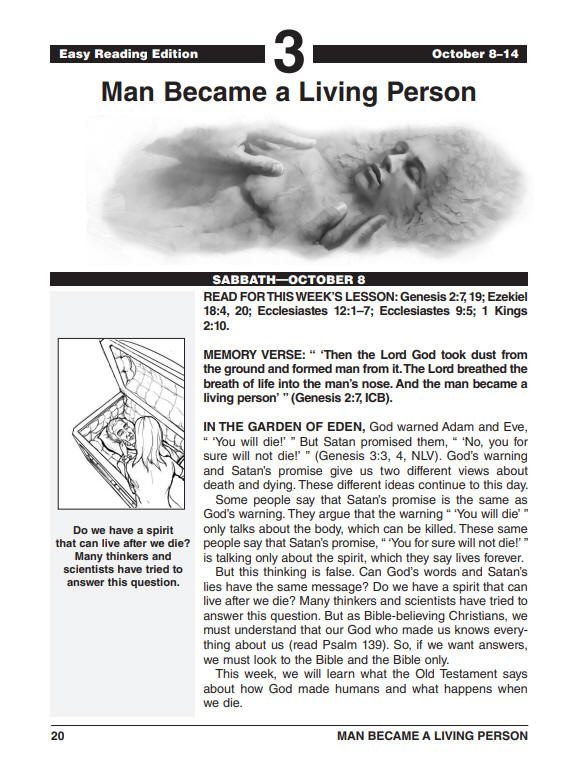MLH or
RIP
“May his/her memory linger in our hearts”
or
“May his/her soul rest in peace.”
Written and complied by Barrington H. Brennen, Oct 14, 2022
Should the phrase "Homegoing
Service" be used for funerals?
The Seventh-day Adventist Church
Adult Sabbath School Lesson for October 8, 2022
titled “Man Became a Living Person” was a
good reminder about the true Biblical teachings
about death.
But what topic was missing for me was the use of the
term RIP: “May his/her soul rest in peace.” I am
mentioning this because I am noticing that far
too many Adventists and other Christians are
saying it or writing the acronym RIP and are not
aware that it is not a true phrase.
I was taught as a child that Adventists do not say or use
“RIP.” Why are some Adventist and other
Christians using it now? Is it because of
ignorance? Or is it because they do not
understand the dynamics of death? Or is it
simple because may are being influenced by
outside sources and not Biblical truth?
I have developed my own phrase I feel speaks to
what Adventists believe. It is “May his/her
memory linger long in our hearts” or “May
his/her memory linger in our hearts” The acronym
is MMLH or MLH.
Here is a little history
“In the 1700s,
however, and probably due to the use of the
original Latin phrase “requiescat in pace”
during Roman Catholic burial rites, both these
words and their abbreviation started appearing
on cemetery tombstones and monuments." (The
Funeral Help Center)
It is important to understand that the use of
RIP is talking about the person’s soul and not
the physical body. This is not Biblical
and it is
not an Adventist teaching. Adventist
teach that the
person, which the body and character, is the soul.
Hence "soul" or "person" has the same meaning.
Note that the original Latin phrase “requiescant
in pace” was actually the prayer itself offered
to a high spiritual power as an expression of
hope that the deceased’s soul would find
peace/comfort according to whatever
religious/spiritual beliefs were relevant”
The latest trend today is using the phrase “Rest
in Power.” It was used during the funeral of
the politician and activist, John Lewis. Both
really make no sense and dose not line up with
Adventist teaching and not the Biblical
understanding of death. Why, because the soul
is the person. The soul is not in the person or
a part of the person. When the person/soul
dies, that is it until the resurrection.
Adventists, please stop saying RIP
“May
his/her soul rest in peace.”
Use MMLH or MLH
“May his/her memory linger long in our hearts”
or “May his/her memory
linger in our hearts”
Or any other phrase the speaks the truth
about death.
Homegoing
The words “Homegoing” as a name for funeral
services, is similar in meaning as the words
“Rest in Peace.” The reason for this wording is
because of the belief that deceased loved ones
are going back home — home to God, peace, and
freedom. That means for many that the deceased
is in heaven looking down to them. Adventists
teach that the dead are dead—cease to exist. No
one goes to heaven upon death. Thus, there is
not home going service. It is a funeral service
that can be called a “Celebration of Life” or
other similar phrases.
1 Thessalonians 4:16-17 makes it clear:
“For the Lord himself will come down from
heaven, with a loud command, with the voice
of the archangel and with the trumpet call
of God, and the dead in Christ will rise
first. 17 After that, we who are still alive
and are left will be caught up together with
them in the clouds to meet the Lord in the
air. And so we will
be with the Lord
forever.
Why would God have to come down for the dead if
they are already in heaven.
Often people talk about how wonderful it is
knowing that their mother or father is in heaven
looking down on them and protecting. This
belief is not consistent with the state of the
dead. Why would God do that to people.
Why would be have those in heaven looking down
on the evil and stupid behavior of their
relatives. That will not make me happy if
I was that person in heaven.
Another sad truth is there have been reports of
a few children who have talked about killing
themselves or actually died by suicide because
they wanted to go to heaven to be with their
mother or fathers. This is so painful and
unfortunate.
"Asleep in Jesus"
Adventists teach that the dead are asleep in
Jesus. Many think that it means sleeping
in reality. Instead it really means death for
the Christian is like a sleep, not literally a
sleep. Note carefully that Adventists
do not teach "soul sleep." The soul is not
sleeping. The person is the soul and the
person is dead.
When one is sleeping he or she
is not aware of the soundings. When waking
up after a long night sleep, the person feels
refreshed and energize.
In the book Questions on Doctrine
it states: “While asleep in the tomb the child
of God knows nothing. Time matters not to him.
If he should be there a thousand years, the time
would be to him as but a moment.”
I am often uncomfortable saying that death is
like a sleep because it can easily be
misunderstood. It should only be used
metaphorically. Here is a quotation from The
Journal of the Adventist Theological Society
scholarly article titled "Death as Sleep:
The (Mis)use of a Biblical Metaphor" written
by Wilson Paroschi, Brazil Adventist University,
2017
“The Adventist view on what happens at death
has been sometimes misunderstood; first,
because the way we ourselves have
occasionally used the sleep metaphor to
describe death and, second, as a result of
the dualistic connotation traditionally
associated with soul-sleep. It could be
argued that this comes from a reading of
Adventist literature unmindful of the larger
context of biblical anthropology in which
these statements are made. This, however, is
no excuse for not making every effort to
express our understanding of the subject as
clearly and completely as possible. Sleep is
not a description of the nature of death.
And it could not be different, as death
means complete cessation of life with all
that it includes.
Sleep can be used to portray death only
phenomenologically. On the lips of Jesus,
the metaphor does carry an important
meaning, but that is only related to the
assurance and immediacy of the resurrection,
not to death as such. This raises a further
point, and that is whether it is valid to
refer to death as an intermediate state.
If death means cessation and resurrection a
recreation, is it not misleading to talk
about an intermediate state? Is there really
a state of the dead to talk about? Would it
not be semantically—and
anthropologically—more precise to refer to
death as an intermediate or an intervening
period (of time) rather than a state?
By misusing the sleep metaphor, we run the
risk of failing to do justice to the
seriousness of death and of detracting from
the true meaning of the resurrection.
Death simply means that life is ended
completely. Asleep in Jesus is simply a
metaphor describing the ended life for the
Christian who believes in the resurrection.
Click
graphic below to download and read the Adventist
Adult Sabbath Lesson
on the
subject of death -- "Man
became a living person"

Click here for audio Version
Here
are a few quotes from the lesson study:
"We see this same warning in Ezekiel 18:4, 20:
“ ‘The person who sins will die’ ” (ICB). This
warning teaches us two things. First, we are all
aging and dying because we are all sinners
(Romans 3:9–18, 23). Second, the idea that the
spirit continues to live after the body dies is
false. If the spirit can’t die, then what
happens to the spirit when our bodies die?
The Bible doesn’t teach that we float around
with no body after we die. We also don’t go to
heaven or hell the same day we die. When we die,
our spirit sleeps. We wait for Jesus to wake up
His followers from the dead at the Second
Coming. Jesus says, “ ‘My Father wants everyone
who sees his Son and believes in him to live for
ever. I will raise him up on the last day’ ”
(John 6:40, WE).
As we saw already, the Bible teaches that the
human is a living person. Another name for a
living person is a soul (Genesis 2:7). A person
or soul has two parts: (1) a body and (2) a
spirit. The Bible also teaches that a person or
soul stops living when the body dies (Ezekiel
18:4, 20). But what happens to the spirit? Does
the spirit stay alive after the body dies? Many
Christians believe this idea. They use
Ecclesiastes 12:7 as proof. This verse says,
“Remember your Creator [God who made you] before
you return [go back] to the dust [the ground]
you came from. Remember him before your spirit
goes back to God who gave it” (NIrV). This verse
does not say that the spirit stays alive when it
goes back to God."
Click here to read the entire lesson.
Click
here to read the Adventist official
statement on the state of the dead.

This video is taken from official Adventist
webpage on the state of the dead.
A Grand
Celebration
Why would God make a big deal about the
resurrection if most of the people are already
in heaven? It is my view that the
second coming of Christ will be like a grand
celebration. Why would God do all of
this celebration for those righteous ones on
earth and leave those, many think are in heaven,
out of the celebration? We have no mention
of a heavenly celebration for those who some
believe "went on before."
Read about this great event in 1 Thessalonians
4:13-18:
13 Brothers and sisters, we do not want you
to be uninformed about those who sleep in
death, so that you do not grieve like the
rest of mankind, who have no hope.
14 For we believe that Jesus died and rose
again, and so we believe that God will bring
with Jesus those who have fallen asleep in
him.
15 According to the Lord’s word, we tell you
that we who are still alive, who are left
until the coming of the Lord, will certainly
not precede those who have fallen asleep.
16 For the Lord himself will come down from
heaven, with a loud command, with the voice
of the archangel and with the trumpet call
of God, and the dead in Christ will rise
first.
17 After that, we who are still alive and
are left will be caught up together with
them in the clouds to meet the Lord in the
air. And so we will be with the Lord
forever.
18 Therefore encourage one another with
these words.
There is no Bible text about those, who some
believe, are in heaven before the resurrection.
How do we celebrate these people? There is
no such thing. During the
resurrection God will be bringing down all the
heavenly orchestra, videographers, sounds
engineers, cinematographers, lighting and
acoustical engineers, to celebrate the
resurrection--angels. It is going to
be grand.
There is no mention how the
previously-gone-to-heaven-people will
participate in the resurrection. There is
also nothing mentioned in scripture how they
will greet each other in heaven. Nothing.
Why? Because there is no such thing.
I will be dead, dead, gone to dust, waiting for
the resurrection.